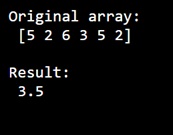Home »
Python »
Python Programs
Calculating a rolling (weighted) average using numpy
Learn, how to calculate a rolling (weighted) average using numpy?
By Pranit Sharma Last updated : October 08, 2023
NumPy is an abbreviated form of Numerical Python. It is used for different types of scientific operations in python. Numpy is a vast library in python which is used for almost every kind of scientific or mathematical operation. It is itself an array which is a collection of various methods and functions for processing the arrays.
Calculating a rolling (weighted) average
we can compute the weighted of a given array with the help of numpy.average() function in which we pass the weight array in the parameter.
This method returns the weighted average of an array over the given axis. The weights array can either be 1-D (in which case its length must be the size of an along the given axis) or of the same shape as a. If weights=None, then all data in a are assumed to have a weight equal to one.
Let us understand with the help of an example,
Python program to calculate a rolling (weighted) average using numpy
# Import numpy
import numpy as np
# Creating two numpy array of 4x4
arr = np.array([5,2,6,3,5,2])
# Display original array
print("Original array:\n",arr,"\n")
# Calculate weighted average
res = np.average(arr, weights=[3, 1, 0, 0,2,4])
# Display result
print("Result:\n",res,"\n")
Output
The output of the above program is:

Python NumPy Programs »
Advertisement
Advertisement